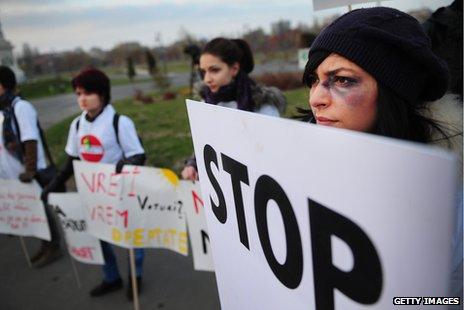Justin Lee Collins: Trial highlights 'invisible' abuse
- Published

TV comedian Justin Lee Collins's court case has attracted much media interest. But does a high-profile case like this help domestic abuse campaigners?
Most people who have never suffered domestic abuse don't know much about it.
So when a court case allows the general public to get an insight into an unpleasant, closed-off world - that affects both men and women - is that a helpful thing?
He has been convicted of harassing his ex-girlfriend Anna Larke, and sentenced to 140 hours of community service.
During the case, there was a slew of lurid headlines around Collins:
TV star made girlfriend sleep facing him and told her to throw away DVDs with actors she fancied
TV presenter 'forced his lover to relive her sex life for notebook'
He gave me a thousand bruises and called me a fat dog who was 'riddled with cellulite'
There were daily details of the physical violence and the bizarre demands made of Larke.
She was subjected to tirades of verbal abuse and ordered to abandon her email account and shut down her Facebook page.
In a recording made by Larke, Collins was heard telling her she could look at inanimate objects - a tree, the ground, a bench - but never another man.
There were the threats that if she fell asleep before him, she ran the risk of him texting other women.
Then there was the Pukka Pad, in which details of her previous sexual encounters and relationships were logged, only to be used at a later date to belittle her.
Many people reading these details may now be able to appreciate that mental abuse can be just as painful as physical abuse. Hitting a partner in the face is generally seen as constituting abuse, but many people don't understand the power of day-in-day-out bullying.
"There will be women who will have been reading the details of the [Justin Lee Collins] case who will say, 'Why is she putting up with this?' when they are certainly putting up with it themselves," says Pat Craven, an-ex probation officer and head of the Freedom Programme, which offers information to women in abusive relationships.
"They may not be able to see that they, themselves, are in an abusive relationship."
And, of course, there will be many men who will also recognise the situation. According to ManKind, one in six men will be a victim of domestic abuse in their lifetime.
"While the verdict in such a high profile is a welcome reminder that women are victims of domestic abuse, we should not forget that men are victims too," says Mark Brooks, the organisation's chairman.
"Female perpetrators can be as controlling as male perpetrators."
Some within the legal profession will have been watching this trial closely because of its focus on controlling behaviour. While this is something that is often cited in divorce cases, a clear message that this is also something for the criminal courts has been sent out.
While Collins was initially arrested on suspicion of assault, he was later charged with a single charge of harassment, causing fear of violence.
Many people do not even realise that mental and emotional bullying is illegal, says Rachel Horman, head of domestic violence at the law firm Watson Ramsbottom in Blackburn.
The harassment charge was originally brought in to deal with stalkers, says Horman, and is the only tool that police can use in a domestic abuse case where there hasn't been any physical violence.
While she says it is increasingly being used in such domestic cases, there are difficulties involved in bringing these kinds of prosecutions. The CPS, courts and police "don't necessarily understand it - more training is needed", says Horman.

A wider definition of domestic abuse to include "coercive control" will be introduced
There is currently no specific statutory offence of domestic violence. It is a general term that defines "any incident of threatening behaviour, violence or abuse (psychological, physical, sexual, financial or emotional) between adults who are, or have been, intimate partners or family members".
But the government recently announced a widening of the definition to include "coercive control" - where one partner controls what another does every day, perhaps by threatening them, preventing them seeing their friends or controlling their finances.
Strictly speaking, those cases could be pursued under existing law but rarely are.
It's an area that a lot of people simply don't know much about and campaigners hope that the Collins case could help inform the debate.
"Psychological and emotional abuse is not generally part of the rhetoric of abuse - it's more focused on the physical," says a spokeswoman for The Women's Resource Centre (WRC). She described such abuse as "invisible".
Larke told the court that she felt that she had been "brainwashed" by Collins - a phrase that Craven says is extremely common in cases of abuse.
"Abusive men hypnotise," she says. "The women only really begin to become aware of what's happening once the violence begins."
But by the time the relationship turns violent, many women may have already endured years of mental and emotional abuse.
"The abusive men I have worked with say they don't use violence until they have their feet under the table - usually until there is a wedding ring or the woman is pregnant," says Craven.
Many people draw conclusions that a lot of women put up with abuse because they have some inherent vulnerability. Anna Larke was depicted as a "recovering alcoholic" and a self-harmer. But Craven points out that one of the biggest myths surrounding abuse is that a "certain kind of women are attracted to abusers".
Annie Munson, manager at Women's Aid Centre, a refuge in Bury St Edmunds for women and their children who are victims of domestic violence, says she has seen an increase in cases of mental abuse.
Men are becoming "cleverer", she says, in finding ways to exert control.
"More men are realising they can't get away with it when they send their partners to the school gates with a black eye. In this more sophisticated age, it's hard to quantify if someone goes to ask for help [for mental bullying]. It's hard to explain and abusers know that."
But she says that more needs to be done to highlight the increase in this type of abuse.
"If nothing else, [Larke] will have done a lot of women a favour."